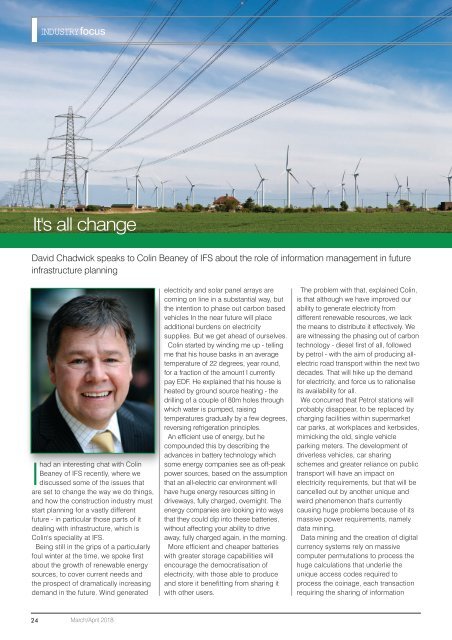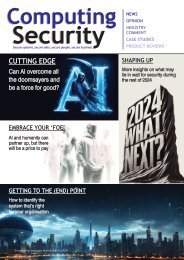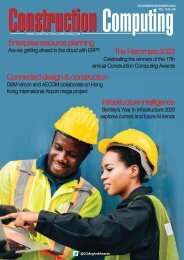CU1803
You also want an ePaper? Increase the reach of your titles
YUMPU automatically turns print PDFs into web optimized ePapers that Google loves.
INDUSTRY focus<br />
It's all change<br />
David Chadwick speaks to Colin Beaney of IFS about the role of information management in future<br />
infrastructure planning<br />
Ihad an interesting chat with Colin<br />
Beaney of IFS recently, where we<br />
discussed some of the issues that<br />
are set to change the way we do things,<br />
and how the construction industry must<br />
start planning for a vastly different<br />
future - in particular those parts of it<br />
dealing with infrastructure, which is<br />
Colin's speciality at IFS.<br />
Being still in the grips of a particularly<br />
foul winter at the time, we spoke first<br />
about the growth of renewable energy<br />
sources, to cover current needs and<br />
the prospect of dramatically increasing<br />
demand in the future. Wind generated<br />
electricity and solar panel arrays are<br />
coming on line in a substantial way, but<br />
the intention to phase out carbon based<br />
vehicles In the near future will place<br />
additional burdens on electricity<br />
supplies. But we get ahead of ourselves.<br />
Colin started by winding me up - telling<br />
me that his house basks in an average<br />
temperature of 22 degrees, year round,<br />
for a fraction of the amount I currently<br />
pay EDF. He explained that his house is<br />
heated by ground source heating - the<br />
drilling of a couple of 80m holes through<br />
which water is pumped, raising<br />
temperatures gradually by a few degrees,<br />
reversing refrigeration principles.<br />
An efficient use of energy, but he<br />
compounded this by describing the<br />
advances in battery technology which<br />
some energy companies see as off-peak<br />
power sources, based on the assumption<br />
that an all-electric car environment will<br />
have huge energy resources sitting in<br />
driveways, fully charged, overnight. The<br />
energy companies are looking into ways<br />
that they could dip into these batteries,<br />
without affecting your ability to drive<br />
away, fully charged again, in the morning.<br />
More efficient and cheaper batteries<br />
with greater storage capabilities will<br />
encourage the democratisation of<br />
electricity, with those able to produce<br />
and store it benefitting from sharing it<br />
with other users.<br />
The problem with that, explained Colin,<br />
is that although we have improved our<br />
ability to generate electricity from<br />
different renewable resources, we lack<br />
the means to distribute it effectively. We<br />
are witnessing the phasing out of carbon<br />
technology - diesel first of all, followed<br />
by petrol - with the aim of producing allelectric<br />
road transport within the next two<br />
decades. That will hike up the demand<br />
for electricity, and force us to rationalise<br />
its availability for all.<br />
We concurred that Petrol stations will<br />
probably disappear, to be replaced by<br />
charging facilities within supermarket<br />
car parks, at workplaces and kerbsides,<br />
mimicking the old, single vehicle<br />
parking meters. The development of<br />
driverless vehicles, car sharing<br />
schemes and greater reliance on public<br />
transport will have an impact on<br />
electricity requirements, but that will be<br />
cancelled out by another unique and<br />
weird phenomenon that's currently<br />
causing huge problems because of its<br />
massive power requirements, namely<br />
data mining.<br />
Data mining and the creation of digital<br />
currency systems rely on massive<br />
computer permutations to process the<br />
huge calculations that underlie the<br />
unique access codes required to<br />
process the coinage, each transaction<br />
requiring the sharing of information<br />
24<br />
March/April 2018

















